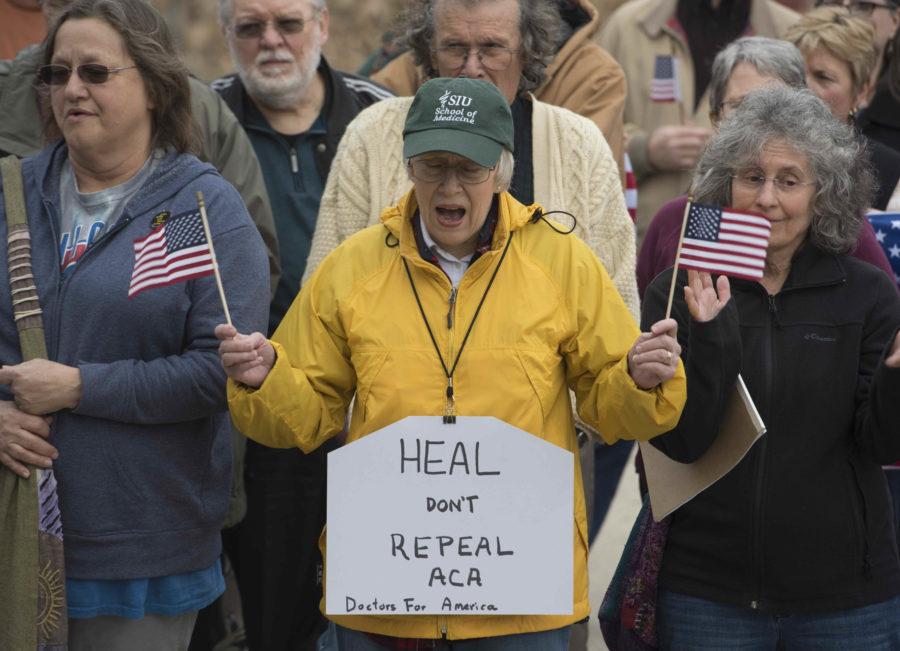Does GOP’s stumble open a new path to universal health care?
Protesters gathered at the office of Republican Rep. Mike Bost on Tuesday, Feb. 21, 2017, to demand he support the Affordable Care Act. Bost twice voted to repeal the act while former President Barack Obama was in office and has said he supports an alternative approach to providing health care for Americans. (Bill Lukitsch | @lukitsbill)
April 6, 2017
The failure of the recent Republican attempt to repeal and replace the Obama administration’s 2010 health care law might have opened a path to the only thing the right fears more: universal health care.
Rep. John Conyers Jr. has introduced a “Medicare for All” bill in every Congress since 2003. But he said he just picked up an 85th co-sponsor, compared to a peak of 63 co-sponsors last year. “I’ve never seen this much energy or grass-roots pressure behind this issue,” he said.
A new Economist/YouGov poll found 60 percent of Americans favor expanding Medicare to insure every American, compared to 23 percent who are opposed. Sixty-one percent support “a federally funded health insurance system that covered every American.”
Advertisement
“At this point, we’ve won that battle” over whether everyone should be covered, Conyers said. “Even Republicans were talking about ‘universal access’ during the health care debate, and Donald Trump guaranteed a plan that will ‘take care of everybody.’
“Some people think it’s about markets and choices and competition,” he said. “In reality, competition drives up costs in this realm. We need to reduce the number of insurers all the way down to one: Medicare.”
In the Senate, Vermont independent Bernie Sanders is preparing to release his own “Medicare for All” bill that he says will create a single-payer system in the U.S. by covering everyone under the existing Medicare program.
Universal health care has also entered the debate in California politics. Lt. Gov. Gavin Newsom has made it part of his campaign platform in his 2018 governor’s run, and state Sens. Ricardo Lara and Toni Atkins introduced a bill in February to set up a single-payer system for the state.
Lara said the introduction of Sanders’ bill “further illustrates that the time is now. If you look at what happened in Canada, single-payer arose from province to province. We can be that change agent in California.”
A federal government-run insurance system that covers every American has long been a policy goal for liberal Democrats such as Conyers, who said it was “inevitable that we will pass this and join the rest of the developed world.” Almost all developed countries have some kind of universal health care program.
Most Republican lawmakers, however, are loathe to see the government provide health care coverage directly, which would affect the powerful private health insurance industry.
Advertisement*
A decade ago, the conservative Heritage Foundation supported passing a plan very similar to the 2010 health care law, as the only way to increase insurance coverage and lower costs while avoiding universal health care.
But Heritage now deems the law “a proven policy failure” and it no longer acknowledges its past support for some of the law’s provisions.
Dan Holler, a vice president at its sister organization Heritage Action, said even after last month’s unsuccessful GOP effort, repeal and replacement “has to happen because the law is hurting people” and because it was a “fundamental promise” Republicans made to their supporters.
Dean Baker, co-director of the left-leaning Center for Economic and Policy Research, said Republicans have no options that would fulfill their promise of repealing the 2010 law without causing mass hardship among people losing coverage.
“They very much want to get rid of the taxes that fund the subsidies in the ACA,” he said, referring to the law by its acronym. But if that happens, Baker said, “People will have to pay far more for their insurance. … We can fragment the insurance market by allowing healthy people to buy low-cost plans, but that means the ones who need insurance most will be stuck with very high-priced plans. There is no way around this logic.”
The failure of the Republicans’ repeal effort last month highlights the corner they’ve painted themselves into. Despite years of basing their rhetoric around the “tyranny” of the health care law, passing more than 60 repeal bills since the 2010 law was passed, and promising something better, Republicans came up with a bill that would have left tens of millions more Americans uninsured without significantly cutting premiums, according to Congressional Budget Office estimates. It was opposed by factions in their own party and rejected by Democrats.
At the national level, plans for universal coverage remain more of a tool to excite the liberal base than a possibility as long as Republicans control Congress and the White House.
___
(c)2017 CQ-Roll Call, Inc., All Rights Reserved
Visit CQ Roll Call at www.rollcall.com
Distributed by Tribune Content Agency, LLC.
Advertisement









